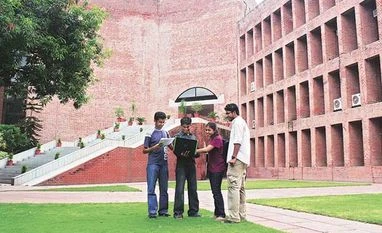In a bid to tap the growing online executive education market among the corporates, IIM-A will be offering six programmes that are blended or a mix of online and offline, Arvind Sahay, chairperson-MDP, IIM-A told Business Standard.
"This year we hope to have about six programmes that are blended (mix of online and offline). This is a substantial increase over last year - and will increase more next year. We are also going to have about 5 programmes that we are going to be delivering internationally across different countries in Asia," said Sahay.
In 2015-16, IIM-A had conducted over 60 open executive programmes (OEPs) and 120 customised executive programmes (CEPs), which rose to 72 open and 150 customised programmes in 2016-17. As against this, in 2017-18, there would be 95 open and 160 customised programmes, up 31 per cent and six per cent over the previous year, respectively.
According to Sahay, the trigger for the growth has been the rising industry requirement for training of middle and senior management in latest sectoral issues.
"Customised programmes tend to be driven by industry requirements. The financial service industry is looking at behavioural finance and neuroscience inputs for better management. Pharma seeks skills to professionalise and upgrade to compete internationally and so on. Conglomerates are looking for more general management and leadership programmes that are customised to their requirements. At VUCA world, the need to upgrade skills and perspectives has been the key driver of increase in attendance in both, OEPs and CEPs," said Sahay.
New programmes in areas such as design thinking, digital marketing and business models, bitcoins and blockchain, and neuroscience in marketing in open programmes have been attracting interest apart from the regular programmes on different functional areas and general management and leadership courseware.
On the other hand, companies are also asking for more customised programmes.
"These are some drivers of the VUCA (volatility, uncertainty, complexity and ambiguity) world. Regulatory and economic changes are other drivers. Digitalisation is simply a symptom. What it causes is an increase in information availability and the velocity of impact of action and it changes the competitive landscape more quickly. All of these necessitate continuous learning, hence more executive education. With increased requirements of multi-skilling of personnel so that they are able to work across functions, there is also the need for more executive education," Sahay added.
To read the full story, Subscribe Now at just Rs 249 a month
Already a subscriber? Log in
Subscribe To BS Premium
₹249
Renews automatically
₹1699₹1999
Opt for auto renewal and save Rs. 300 Renews automatically
₹1999
What you get on BS Premium?
-
Unlock 30+ premium stories daily hand-picked by our editors, across devices on browser and app.
-
Pick your 5 favourite companies, get a daily email with all news updates on them.
Full access to our intuitive epaper - clip, save, share articles from any device; newspaper archives from 2006.
Preferential invites to Business Standard events.
Curated newsletters on markets, personal finance, policy & politics, start-ups, technology, and more.
Need More Information - write to us at assist@bsmail.in
)